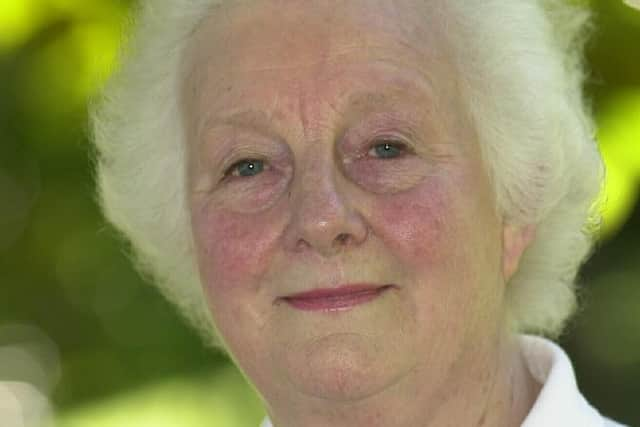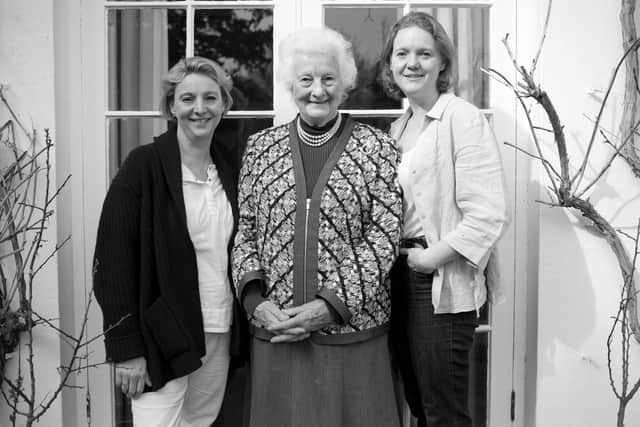VIDEO: Fond tributes to Judith Buckland, founding chairman of the Arundel Festival and former High Sheriff
and live on Freeview channel 276
Judith lived in Chichester for the past five years but before that lived in Lyminster, near Arundel, for 40 years and it was from there that she set up the Arundel Festival, initially to mark the Queen's Silver Jubilee in 1977. Her husband Major-General Ronnie Buckland died, aged 87, in 2008.
Daughters Alexandra Anderson and Caroline Burn have confirmed that Judith’s funeral will be on Friday, April 14 at St Paul's Church in Chichester at 11am and that everyone will be welcome.
Advertisement
Hide AdAdvertisement
Hide AdInitially Judith worked in the film industry after attending finishing school, the so-called Monkey Club in London: “At first she started working for Michael Powell, the film director,” Alexandra said, “and the first film that had her name on the credits was Honeymoon made in 1959 (starring Anthony Steel, Ludmilla Tchérina and Antonio El Bailarín). She was Michael Powell's assistant and then in 1960 Michael Powell made the infamous Peeping Tom, again with mother’s name in the credits.”


The controversial psychological thriller created an enormous furore, Alexandra recalls: “It was a bit too much and as a result Michael Powell stopped making films so mother went on to work for MGM and she was there for about eight years until 1968.”
Among the films she worked on was The Comedians starring Richard Burton, Elizabeth Taylor and Alec Guinness. However her film days were coming to an end. She had met her future husband Ronnie.
Caroline recalls: “Dad had to ask the army permission to marry my mother and the army did not think working in the film industry was something a brigadier’s wife should be doing, and unbelievably she stopped but she found other ways to be creative.”
Advertisement
Hide AdAdvertisement
Hide AdWhen Ronnie’s work took him to Salisbury, “as a dutiful wife she moved to a nice house in Salisbury and became involved in the Salisbury Festival,” Caroline said. “If she was not the actual founder then she was certainly one of the people that said ‘Wouldn't it be wonderful if Salisbury had its own arts festival.’”


After Ronnie left the army and moved into Civvy Street, the family moved to Lyminster.
Alexandra recalls: “In 1977 for the Queen's Silver Jubilee the Duke of Norfolk wanted to do something to mark the occasion. He came up the idea of putting on a play in the grounds of Arundel Castle and somebody said to him ‘If you want somebody to organise something in the arts, then speak to Judith who has fairly recently moved to the area.’ He got in contact with her. In that first year it was just the one night, but they all thought it was fun and they all thought let's do it again next year. It was set up as a registered company with mother as the chairman in 1980 and she continued in that role. She stepped down from 1999 to 2000 when she was High Sheriff and then returned for two years, finally stepping down in 2002.
“She was always someone who had a real interest in the arts, all the arts and not just music. It was plays and poetry and she wanted to make it as diverse as possible. And she was also remarkably good at getting sponsorship. In fact she won an award for that, the Garrett Award in 1995. The citation on the award was for outstanding professional achievement in the encouragement of business support for the arts.”
Advertisement
Hide AdAdvertisement
Hide AdAs Caroline recalls, the fact is that she “told a very good story. She was very good and very clear as to why she needed the support, and in those days there was a lot more sponsorship money around. She was also very good at corralling the troops. Everything was done by volunteers pretty much at the festival and if someone wanted to whinge about something, she would listen and be very empathetic about their concerns. The way that she approached it all made sure that there was very much a family feel to everything.”
Her film experience made sure that she knew exactly how to work with the artists, as Alexandra says: “When Elizabeth Taylor in The Comedians didn't like the inside of the place where she was, mother had to get it completely repainted and calm her down!”
Judith will also be remembered for her sense of humour and as a great raconteur with a considerable array of stories. Caroline recalls: “You think of your parents as people just to drive you places when you are young, but when I was allowed to stay up for dinner parties, I recognised that my mother had a lot of really great stories and she told them in a fantastic way.”
Also important to Judith was her faith, as Alexandra says: “Mother had a very strong faith and she inherited that. It was with her throughout her life, and as soon as she moved to Chichester she wanted to find the nearest church. It has always been something that played a very important part in her life particularly when my father died back in 2008.”
Advertisement
Hide AdAdvertisement
Hide AdCaroline again: “As she was nearing the end of her life she was very clear that she would be reunited with my father and that was one of the reasons her passing was so peaceful, the fact that she was not afraid of an unknown. She had absolute faith that there was something else and that she would see my father again.”